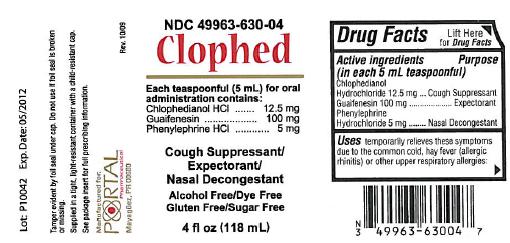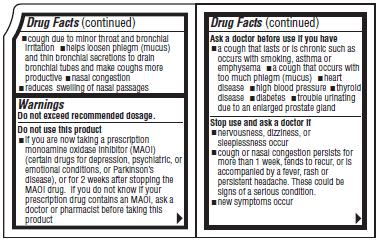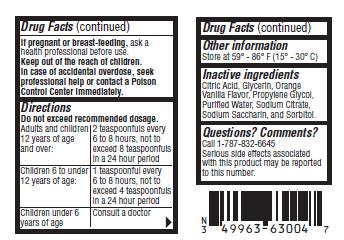
Clophed | Chlophedianol Hydrochloride, Guaifenesin, Phenylephrine Hydrochloride Liquid while Breastfeeding
What is Clophed | Chlophedianol Hydrochloride, Guaifenesin, Phenylephrine Hydrochloride Liquid ?
Brief: Cough Suppressant Expectorant Nasal Decongestant
Can I use Clophed | Chlophedianol Hydrochloride, Guaifenesin, Phenylephrine Hydrochloride Liquid while breastfeeding?
Clophed | Chlophedianol Hydrochloride, Guaifenesin, Phenylephrine Hydrochloride Liquid Breastfeeding Analsys
Guaifenesin while Breastfeeding
Low RiskCAS Number: 93-14-1
It is used as an expectorant, alone or in association with other products. Proofs on its effectiveness are sparse. In some instances, preparations of Guaifenesin may contain alcohol as excipient with a concentration as high as 5%. At latest update, relevant published data on excretion into breast milk were not found. Until more information on this medication is available, other option known to be safer would be recommended, mostly in the post-natal period or in cases of prematurity. If used while breastfeeding, a moderate use with the lowest dose as possible and avoiding those preparations with alcoholic excipient, should be preferred. Because effectiveness is poor and likelihood of side effects does exist, especially in multi-association, the US Agency for Drug Administration (FDA) is currently doing efforts for discontinuation of this and others at-the-counter products, that are formulated for cough relief (Guaifenesin, Dextromethorphan, Phenylephrine, Pseudoephedrine, Brompheniramine, etc.)
Phenylephrine hydrochloride while Breastfeeding
Low RiskCAS Number: 59-42-7

Used on topical decongestant solutions for nose drops at low concentration. 10% midriatic eye drops are available. Because low concentration is used on nose and ophtalmic drops a significant excretion into breast milk is unlikely. Low oral biodisponibility minimizes any risk of harmful effect in the infant. Authorized for nasal or ophtalmic use on children aged younger than 1 year. Although on latest update relevant data on breastfeeding was not found it is considered to be safe when minimal dose is used. Avoid excessive or long term use. A related drug Pseudoephedrine can inhibit milk production. It would be advisable to press on the lachrimal sac to minimize absorption.
Clophed | Chlophedianol Hydrochloride, Guaifenesin, Phenylephrine Hydrochloride Liquid Breastfeeding Analsys - 2
Guaifenesin while Breastfeeding
CAS Number: 93-14-1
Neither the excretion of guaifenesin in milk nor its effect on breastfed infants have been studied. It is unlikely that with usual maternal doses amounts in breastmilk would harm the nursing infant, especially in infants over 2 months of age. It is best to avoid the use of products with a high alcohol content while nursing.
Phenylephrine hydrochloride while Breastfeeding
CAS Number: 59-42-7
The oral bioavailability of phenylephrine is only about 40%,[1] so the drug is unlikely to reach the infant in large amounts. However, intravenous or oral administration of phenylephrine might decrease milk production. Because no information is available on the use of oral phenylephrine during breastfeeding, an alternate drug may be preferred, especially while nursing a newborn or preterm infant.Phenylephrine nasal spray or ophthalmic drops are less likely to decrease lactation. To substantially diminish the effect of the drug after using eye drops, place pressure over the tear duct by the corner of the eye for 1 minute or more, then remove the excess solution with an absorbent tissue.

What should I do if I am breastfeeding mother and I am already exposed to Clophed | Chlophedianol Hydrochloride, Guaifenesin, Phenylephrine Hydrochloride Liquid?
Not much study has been done on safety of Clophed | Chlophedianol Hydrochloride, Guaifenesin, Phenylephrine Hydrochloride Liquid in breastfeeding and its ingredients. Even we do not have complete information about usage of Clophed | Chlophedianol Hydrochloride, Guaifenesin, Phenylephrine Hydrochloride Liquid in breastfeeding so at this point a trained medical professional could be your best bet. If you observe anything abnormal with your baby please contact 911.
My doctor has prescribed me Clophed | Chlophedianol Hydrochloride, Guaifenesin, Phenylephrine Hydrochloride Liquid, what should I do?
If your doctor considers Clophed | Chlophedianol Hydrochloride, Guaifenesin, Phenylephrine Hydrochloride Liquid safe enough to prescribe for you that means its benefits should outweigh its known risks for you.
If I am using Clophed | Chlophedianol Hydrochloride, Guaifenesin, Phenylephrine Hydrochloride Liquid, will my baby need extra monitoring?
We are not Sure, Please check with your healthcare provider or doctor.
Who can I talk to if I have questions about usage of Clophed | Chlophedianol Hydrochloride, Guaifenesin, Phenylephrine Hydrochloride Liquid in breastfeeding?
US
National Womens Health and Breastfeeding Helpline: 800-994-9662 (TDD 888-220-5446) 9 a.m. and 6 p.m. ET, Monday through Friday
UK
National Breastfeeding Helpline: 0300-100-0212 9.30am to 9.30pm, daily
Association of Breastfeeding Mothers: 0300-330-5453
La Leche League: 0345-120-2918
The Breastfeeding Network supporter line in Bengali and Sylheti: 0300-456-2421
National Childbirth Trust (NCT): 0300-330-0700
Australia
National Breastfeeding Helpline: 1800-686-268 24 hours a day, 7 days a week
Canada
Telehealth Ontario for breastfeeding: 1-866-797-0000 24 hours a day, 7 days a week
